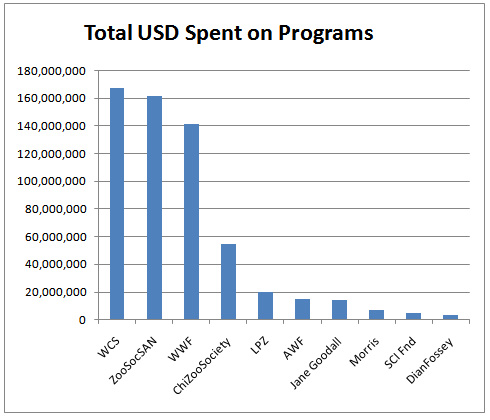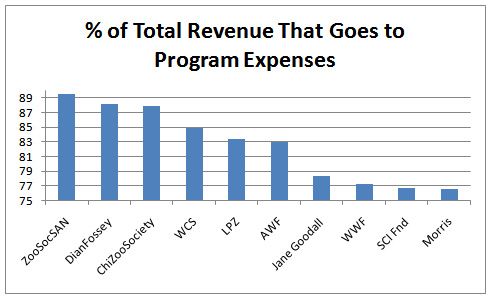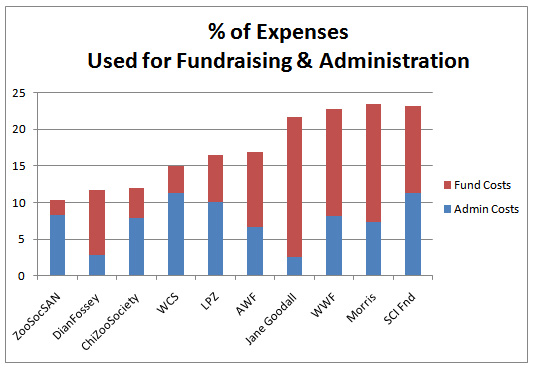 I am constantly asked what good charity to support for wildlife conservation in East Africa. Here’s a start.
I am constantly asked what good charity to support for wildlife conservation in East Africa. Here’s a start.
I’ve compiled basic information from ten wildlife charities that is described for you, below, which I personally feel are the best of many good ones.
But first I must restate my theoretical opposition to all charities in East Africa, whether they be for wildlife conservation or poverty eradication. I’ve been around long enough to know things aren’t getting better; they’re getting worse.
A half century of charities has not improved the situation in East Africa. It certainly has helped to reduce the decline, but to improve overall situations we need government to government action. Nothing less.
When governments were aggressively assisting East Africa in the 1970s and early 1980s (for strictly strategic reasons: the Cold War), things began to improve. When the Cold War ended, aggressive assistance ended, and things started to get worse.
Not all the charities in the world combined even begin to approach the impact of a single western government aid agency.
So before you choose a charity to support, look carefully at how you can support your various government agencies if you really want to help improve the situations in East Africa.
Charities provide a critical role in lobbying and focusing government action. They’re often the first responders to emergencies that are not catastrophic but still devastating, and probably most of all, they relieve our guilt: A guilt that I fervently believe we should cultivate until we fully grasp its meaning.
The ten charities are all licensed American not-for-profits, because those are the most likely to generate a tax deduction and the ones which you’ll be able to best research. Yet there are a number of non-American, mostly smaller charities, which are very active in East Africa, as well as a number of stellar individuals. You can find references to those at the bottom of this blog.
One of the immediate things I think you’ll notice is that American zoos are quickly becoming the significant force in wildlife conservation in East Africa. Over the last several decades, zoos in general have begun to adopt the international conservation practices that only a few, like the Bronx, did in the past.
Four of my ten recommendations are American zoos. And what this means is that it is quite likely that your own zoo, although not quite in the league of these, undertakes wildlife conservation activities worthy of your support.
How did I pick these ten?
Mostly from experience. And then through some basic analysis discussed below. But I began with my own encounters with these organizations in East Africa, and I like what they’re doing.
What I don’t like about them, almost every one, is the guarded way that they work independent of one another. As charities achieve success they tend to become exclusive. They covet their data as they covet their donors, and what this means is that resources are wasted and studies unnecessarily duplicated.
The zoos, in fact, are the least offenders. They’re more transparent and open with their data, and they’re most willing to engage in cooperative efforts.
My pick of ten (in alphabetical order) are the African Wildlife Foundation (AWF), the Chicago Zoological Society (ChiZooSociety), the Dian Fossey Gorilla Fund International (DianFossey), the Jane Goodall Institute (Jane Goodall)
, the Lincoln Park Zoo (LPZ), the Morris Animal Foundation (Morris), the Safari Club International Foundation (SCI Fnd), the Wildlife Conservation Society of the Bronx Zoo (WCS), the World Wildlife Fund (WWF), and the Zoological Society of San Diego (ZooSocSAN).
SCI Fnd is supported by hunters. I am not a hunter and do not understand why anyone hunts, but the work that SCI Fnd does, like Ducks Unlimited at home, is worth considering.
Dian Fossey and Jane Goodall were horrible researchers and very bad people. But their success in sensitizing the American public to primate issues in East Africa is unquestionable, and their foundations are now doing the good work that they didn’t do as individuals.
Three organizations work almost exclusively with primates: Jane Goodall, DianFossey and Morris. But I’ve chosen them not for that reason, but because their work extends significantly into the human/animal conflicts that apply to all areas of wildlife conservation.
And finally, WWF. I have a lot of concerns with WWF, most importantly its exclusiveness and real reticence to share data and projects. But WWF is so big (see below) and so experienced that it is by its very definition the default organization. If nothing else tweaks your interest, if you don’t have the time to do some research, a donation to WWF will be well spent.

SO how to choose among these ten?
You should have some simple set of objectives: such as certain animals, or environmental or climate concerns, to guide your research and speed your analysis. After that here are two general parameters you need to put into your mix, that I have obtained from Charity Navigator where you can obtain a wealth of additional information about all the charities discussed.
The actual amount of your donation which really gets into the field I believe is critical to vetting the charity’s honesty and real intentions. This is a significant factor, and all the charities discussed have very good ratings.
(All figures shown are for the calendar year ending 2008.)

You can look at this another way: how much isn’t spent on administration and fund-raising?

And finally, there is no starker region of the world to demonstrate the injustice of the growing divide between the haves and have-nots as Africa. So I think it fitting to review with a lot of skepticism the compensation that the executive in charge of these organizations receives.
With practically all of them, it’s too much. It’s not sufficient for me to be told that they are simply “responding to the market” to get good people, or that the “private sector gives much more.”
We know the private sector gives much more: it gives way too much more! And I think that organizations founded on altruism, nonprofitism, ought to practice what they preach.

There are two charities which I really like but are still too young and small to have a track record like those mentioned above. But they might still be worthy of your consideration. Take a look at The International Rhino Foundation, and the Wildlife Conservation Network.
All the above have a worldwide scope; even the primate charities support projects as distant away as Borneo. If you can overlook the tax deduction issues, here are much smaller charities (many in Kenya) with a scope mostly focused on just African wildlife:
Save the Elephants is the foundation set up by the legendary elephant researcher, Ian-Douglas Hamilton, with his wife, Oria. There could hardly be two more selfless individuals in a cause for animal protection.
The Daphne Sheldrick Wildlife Trust is another good organization in Kenya dedicated mostly to elephant conservation.
Wildlife Direct is the brain child of Richard Leakey, a young organization that is growing by leaps and bounds and shows incredible promise.
The William Holden Wildlife Foundation is known mostly by its Animal Orphanage at the Mt. Kenya Safari Club, but in fact is much more critical for financing Kenyan school children’s environmental “camps”, which actually gets young Kenyans into game parks.
Cynthia Moss’ Amboseli Trust for Elephants is one of the most proactive forces in East Africa.
The Tusk Trust is currently the darling of Prince William, a British conservation charity with near 95% pass-through of its funds into direct projects in East Africa.
Finally, there are several researchers in East Africa which I think are doing as much if not more important work than entire charities! They are independent and not associated with any single organization.
Anna Estes and Charles Foley working on elephants and human/animal conflicts, and Bruce Patterson working on predators.
I hope this helps. But remember, whatever you give, your donation is essentially limited by the size of all these organizations, whose optimum performance (even in consortium) falls far below the threshold of being able to create real, good change in East Africa.
And we need real, good change in East Africa. For that vote Democratic and support progressive international causes by your government and its agencies!
Jim,
Thanks for doing the research on these organizations and putting it in your blog. It’s a real service to those of us who donate to conservation causes.
George
A nice analysis. I like that you put in CEO salaries. No matter what
proportion of operating expenses — most are inexcusable.
I also like the comment about government support.
Terese
Jim, thank you for putting this together – I concur with your selections!!
-Mena
Many thanks, Jim, for assembling this. As I am currently doing research on where my donation for a wildlife conservation organization would best be made, this is very useful. On looking further on the Charity Navigator site, I see that in fiscal 2010 (the most recent data), the head of the Wildlife Conservation Society received $1,567,687 in compensation. How is this justifiable, and, knowing this, would WCS still be on your list? This is an astonishing sum, and double what is listed above, which is probably from the previous year. (?!) I think that the Wildlife Conservation Network will get my vote this year…they run a very tight fiscal ship and their models are innovative.